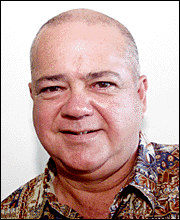


’Pen Pal
IN the clinics I've conducted over the years, inevitably some of the topics groups wanted reviewed concerned practices and motivation. Coaches need an
education as wellThe people coaching our youth leagues are donating their time and effort, and that should be appreciated.
There are, however, certain standards that assure that the best possible coaching takes place. Here are some suggestions to assist you toward that goal:
Be organized: Have a written plan each day. By writing a plan, you'll be able to remember what you've covered, and it will allow you to sit and think about what else needs to be taught.
Get help: Surround yourself with assistant coaches who'll be able to adjust to your style of coaching. I realize that in the youth leagues parents are often the coaches, but try to do this anyway.
Vary practice plans: Baseball practice can be flat-out boring, so make it interesting by doing different things each day.
Teach proper fundamentals: There are differences for every aspect of the game, but there are certain standards to teach. Attend clinics, ask for help from reputable sources and read about the skills that need to be taught.
Make practices short: Don't keep the kids out for longer than an hour and a half. This can be accomplished if you're organized and can have more than one activity going on at the same time.
Don't over-condition: Young people through approximately age 10 have innate energy that is enough to sustain them through a season. Conditioning is fine, but don't overdo it. Relays to end practices are usually well-received.
Be fair: Treat a player like you'd want your own son or daughter to be treated. Let everyone play, regardless of their ability level. There's plenty of time in their later years to get real serious. Play with the team you've been given and don't cheat by bringing ringers in while you tell your less talented kids to stay home.
Educate, don't dictate: Coaching is teaching. Teaching is educating. Therefore, coaching is educating. There's little need to rant and rave about mistakes. These are little kids, not college or professional players. Teach life's lessons, along with baseball fundamentals.
Participation should be fun: Make your drills into games that challenge the kids. They need to laugh to keep from becoming bored. There should be serious times as well, but have at least one or two drills that are fun.
IT'S IMPOSSIBLE to have every coach thoroughly enjoy their association with young people. So many of them want to win and they believe that's the main reason they're coaching.
I do realize that there are those who don't feel that way, but I have seen way too many great athletes turned off from baseball due to a coach who yelled too much, a coach who was unfair or boring practices.
Winning is important, but not nearly as important as allowing the kids the opportunity to participate in this great game of ours.
Challenge yourself to become the most thorough coach you can be.
Pal Eldredge is a baseball commentator for KFVE
and former varsity baseball coach at Punahou School.
His column runs Mondays during the Major League Baseball season.
Star-Bulletin sports can be reached at 529-4785 or: sports@starbulletin.com